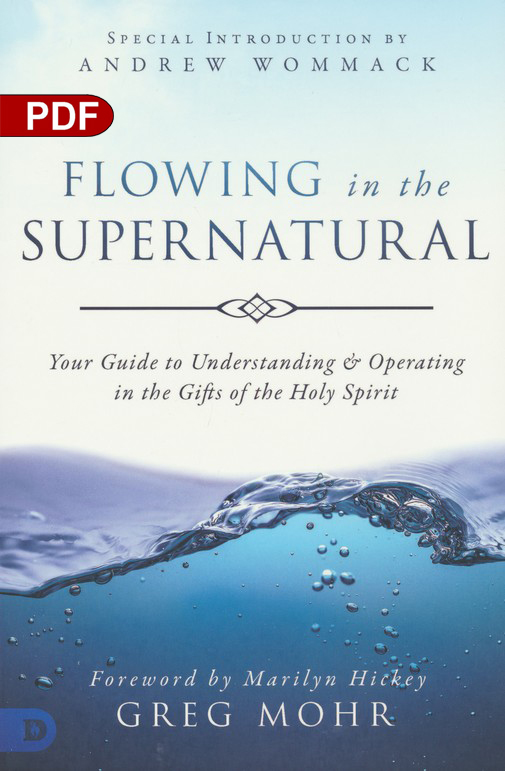Ebook PDF Download)
By Greg Mohr
Price: $16.99
I'm grateful for my friend Quentin Beard, who pastors one of the fastest growing churches in South Dakota, Sioux Falls First Assembly. Because Quentin wants his congregation to experience the Holy Spirit, he scheduled a special weekend of meetings so that people could be baptized in the Holy Spirit, get healing prayer and receive personal prophetic ministry.
The day before the event, I asked Quentin if we could have a larger-than-normal bottle of oil on the altar near the stage. Most churches just have a small cruet or vial of oil; I wanted more, so one of the church's pastors filled a half-gallon bottle. The quantity of oil was prophetic in itself, because the Lord visited us in power. Many people were filled with the Spirit during those three days.
Are you hungry for more of the Holy Spirit in your church? It's time to stop limiting His power.
Everywhere I go, I hear pastors asking how they can we encourage the freedom of the Holy Spirit in a church culture that has become increasingly scripted, scheduled and controlled right down to the nanosecond. The essence of Pentecost, which came "suddenly," was its unpredictability. But there seems to be no room for God's sudden surprises when we already have our sermons planned out for the next six months.
Here are eight practical things we can do to encourage the freedom of Pentecost in our churches:
Teach about the Holy Spirit often. The Holy Spirit was rarely mentioned in the church I grew up in, so we never expected Him to do anything. Yet He is described in the second verse of the Bible as "moving" upon the surface of the newly created world (Gen. 1:2), and He has one of the last messages in the Bible (see Rev. 22:17). He moves and He speaks throughout the Scriptures! But we must invite Him to move and speak by giving Him the place He deserves.
Leave room for personal prayer ministry. A church without altar ministry is like a hospital without a maternity ward. New life begins at the altar—whether it is salvation, healing, prophetic ministry or the impartation of a fresh anointing. Today many churches that offer multiple services often skimp on ministry time because they are focused on herding the 10 a.m. group out of the sanctuary to get ready for the 11:30 a.m. crowd. Multiple services are fine, but we are crowding the Spirit out of the church if we don't schedule time for people to respond to the message.
Have small groups where people can use the Holy Spirit's gifts. It's not practical for everyone to prophesy or exercise other spiritual gifts in a large congregation. But if people are plugged into small groups, there will be opportunities for believers to encourage one another in supernatural ways. And people are more comfortable stepping out in faith in front of 10 people than they are in front of 3,000.
Train people in prophecy, healing and Spirit-led ministry.Many pastors clamp down on the operation of spiritual gifts because a few fanatics with inflated egos like to pull the church into weirdness. But in our effort to protect the sheep from deception, let's not pull the pendulum to the other extreme by forbidding the gifts of the Spirit. The genuine power of God will flow if we teach people the difference between authentic anointing and strange fire.
Offer "teaching moments" to explain the gifts of the Spirit. I've been in churches where Brother Herschel or Sister Agnes prophesied in such a harsh, condemning tone that everyone in the church let out a collective groan. Their "words from God" had the same effect on the congregation as fingernails on a chalkboard. We cannot just ignore these moments and move on. When the Corinthians mishandled speaking in tongues and prophecy in the first century, the apostle Paul used their mistakes as an opportunity to teach about how to use gifts properly.
Expose your church to healthy ministries that flow in the anointing. God has raised up thousands of prophets who have not bowed their knees to the Baals of exploitation, greed and gimmicks. We need life-giving traveling ministries because God sends them to win new converts, heal the sick, unleash prophetic power, train leaders and impart new vision in congregations. We should not be afraid to expose our churches to men and women of character who are called to minister in the supernatural.
Give time for testimonies of God's supernatural power. Nothing raises the faith level of a congregation like someone's raw experience with God. If a man was healed this week in your church, let him shout it from the housetops. If an infertile couple got pregnant, let them tell about the goodness of God. Stories of supernatural intervention trigger a holy expectation in everyone—and God gets the glory for His miracles.
Preach about holiness. Let's never forget that the Holy Spirit is holy. Many churches today have stopped warning God's people about the dangers of sin, so we don't confront anymore. We've figured out that people will pack the house if we give them sugary-sweet motivational pep talks that never step on toes. By avoiding the tough topics, we've essentially told the Holy Ghost to take a hike.
We will be celebrating Pentecost in a few weeks. Let's fling open the doors and allow the Spirit to have His way. Instead of being afraid of what He might disrupt or whom He might offend, let's rather fear what our churches would be like without Him.
Lee Grady



 Flowing in the Supernatural
Flowing in the Supernatural